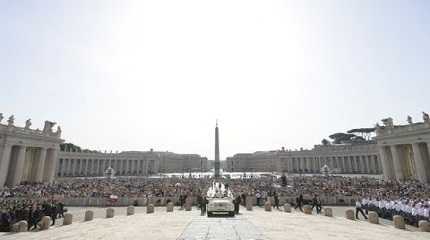
VATICAN CITY, Sept 21 (Reuters) - Two bishops from mainland China are due to attend a major Vatican meeting next month, officials said on Thursday, a positive sign after recent tensions between the Holy See and Beijing.
The two bishops were chosen by their brother bishops in China, meaning they likely had approval from the Communist government, which holds great sway over the Chinese Catholic Church.
The two are Anthony Yao Shun of Jining and Joseph Yang Yongqiang of Zhoucun, officials said at a press conference.
After they were proposed by the local Church, Pope Francis named them as two of his personal nominees to the month-long meeting of bishops, known as a synod.
They are expected to attend the entire synod. Two other Chinese bishops were allowed by the government to attend another synod for the first time in 2018 but did not stay for the entire meeting.
A bishop from Hong Kong will attend, as will one from Taiwan, which Beijing claims as its territory.
Beijing has been following a policy of "Sinicisation" of religion, trying to root out foreign influences and enforce obedience to the Communist Party.
A landmark 2018 agreement between the Vatican and China on the appointment of bishops has been tenuous at best, with the Vatican complaining that Beijing has violated it several times.
Two months ago the Vatican chided Beijing for not consulting over the transfer of two bishops from one diocese to another.
OVERTURES TO BEIJING
During his trip earlier this month to Mongolia, which has a long border with China, Francis made several overtures to Beijing, in apparent efforts to overcome recent tensions.
At one event, he called the Chinese a "noble" people and asked Catholics in China to be "good Christians and good citizens".
At another, he said governments have nothing to fear from the Catholic Church because it has no political agenda.
The Oct. 4-29 synod has been in preparation for two years, during which Catholics around the world were asked about their vision for the future of the Church.
Proponents have welcomed the consultations as an opportunity to change the Church's power dynamics and give a greater voice to lay Catholics, including women, and people on the margins of society.
Conservatives say the process has been a waste of time, may erode the hierarchical structure of the nearly 1.3 billion-member Church and in the long run could dilute traditional doctrine. A second final session will be held in 2024.
About 365 "members" with voting rights will attend, along with about 100 other participants such as observers and delegates from other Christian Churches. Women will be allowed to vote for the first time.




